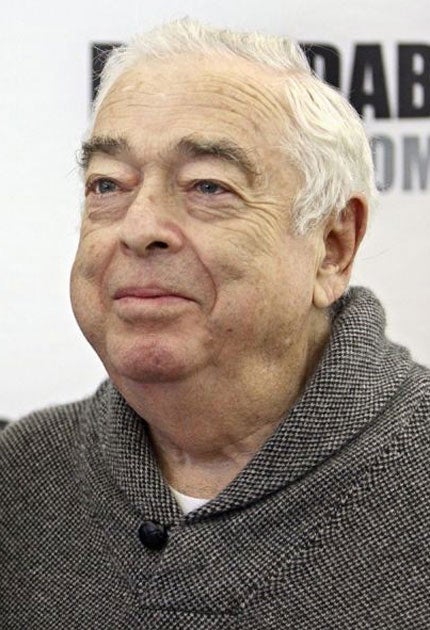Jerry Bock: Composer best known for writing the music for ‘Fiddler on the Roof’

As a composer and lyricist Jerry Bock won a string of awards for his musicals. Often they had a satirical bent but the best-known remains Fiddler on the Roof, which includes some of his greatest hits: "Tradition", "Matchmaker, Matchmaker", "If I Were a Rich Man" and "Sunrise, Sunset". With the lyricist Sheldon Harnick he produced a series of hits and formed one of the most important musical partnerships of the 1960s.
Bock studied piano as a child and wrote music for high-school shows in Flushing. Attending the University of Wisconsin-Madison, he wrote his first musical, Big as Life, about Paul Bunyan, with the lyricist Larry Holofcener. It was an early success and after touring the state had a run in Chicago.
After graduating, Bock and Holofcener worked for Pennsylvania's Tamiment Playhouse and on television revues. In 1955 they contributed to the Broadway show Catch a Star, and in 1956 to Mr Wonderful. The latter, a version of Sammy Davis Jr's stage show, also found a role for Davis Sr and its title song became a standard. The show introduced Bock to Joseph Stein, who would later write the book for Bock's greatest success.
Bock's first collaboration with Harnick had a book by Stein and Will Glickman: The Body Beautiful (1958) concerned a Dartmouth College graduate who wants to be a boxer. It only lasted 60 performances but attracted funding for their next show, Fiorello! (1959), which charted the rise of the 1930s New York mayor Fiorello La Guardia. Ruthlessly pragmatic, he was a New Deal Republican who wooed various interest groups: one song takes him through English, Italian and Yiddish. The overture sets the scene, with a police siren book-ending a series of 1930s dances. It ran for two years and picked up Broadway's triple crown: the New York Drama Critics' Circle Award, a Pulitzer Prize for drama, and three Tonys (sharing one with The Sound of Music).
Tenderloin (1960) was another historical piece, a fast response to Samuel Hopkins Adams's 1959 novel, in which Reverend Brock attempts to clean up Manhattan's 1890s red-light district and takes on corrupt police and politicians. Cecil Beaton's costume designs were among its Tony nominations, and Bobby Darin later had a hit with the song "Artificial Flowers".
In 1963 the pair adapted Miklos Laszlo's play Parfumerie into She Loves Me. (The play also inspired the 1940 film The Shop Around the Corner, the 1949 Judy Garland musical In the Good Old Summertime and the 1998 Tom Hanks-Meg Ryan comedy You've Got Mail.) Touched with Austro-Hungarian sentimentality, it was another huge hit and was revived in 1993 and 1994 in New York and London, picking up, respectively, a Tony and an Olivier Award.
Bock and Harnick's greatest success came in 1964 with Fiddler on the Roof, their adaptation of Sholom Aleichem's stories about Jews in the Tsarist Pale. The first run of 3,000-plus performances transferred through three theatres, becoming the longest-running Broadway musical up to that point. The big set-piece prologue integrates the oom-pah song Tradition, Jewish-inflected virtuoso violin solos and black Russian-Jewish humour that encapsulates the stories' laughter through tears. It won nine of the 10 Tonys for which it was nominated and paid back over $1,500 for every dollar invested.
Though Zero Mostel had played the lead on Broadway, Norman Jewison's 1971 film version made a star of Topol, who had played it in London. It further enhanced the show's popularity and stage revivals followed – several times starring Topol (last year's was his farewell to the role). In 2004 Bock took the opportunity to tweak the score, replacing one of the songs. It has also spawned a dazzling array of cover versions, by artists from Cannonball Adderley to Gwen Stefani.
After Fiddler's success, Bock and Harnick were brought in to help the Sherlock Holmes musical Baker Street in 1965. Though it had struggled out of town, refashioned it had a respectable run. Their next work together was The Apple Tree (1966), a portmanteau adaptation of stories about self-realisation by Mark Twain, Frank R Stockton and Jules Feiffer. In 1970 Bock and Harnick returned to Jewish stories and musical biography with The Rothschilds, the story of the banking family's 18th- and 19th-century beginnings in the Frankfurt ghetto.
As well as musicals, Bock occasionally contributed incidental music to plays, including William Goodhart's comedy Generation (1965), starring Henry Fonda. Though his musicals were often adapted for the screen, Bock's only feature-film score was A Stranger Among Us (1992), in which a cop goes undercover in New York's Hasidic Jewish community. In 1997 he wrote a musical on the improbable subject of the US tax code but, after a read-through, the librettist Jerry Sterner decided to present 1040 as a straight play. Bock's last project, with a script by Evan Hunter, was Counterpoint.
Bock's scores evoke a range of locales and times and portray strong, though often complex, central characters and he was fortunate to find interpreters who were up to the task. He was always artistically generous, seeing the musical as a collaborative genre, and shared the credit for his awards.
Joseph Stein, Fiddler's lyricist, recently died and Bock spoke at his funeral, 10 days before his own death.
Jerrold Lewis Bock, composer: born New Haven, Connecticut 23 November 1928; married 1950 Patricia Faggen (one son, one daughter); died Mount Kisco, New York 3 November 2010.
Subscribe to Independent Premium to bookmark this article
Want to bookmark your favourite articles and stories to read or reference later? Start your Independent Premium subscription today.

Join our commenting forum
Join thought-provoking conversations, follow other Independent readers and see their replies